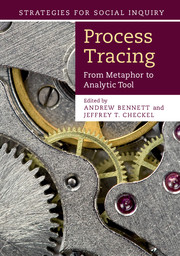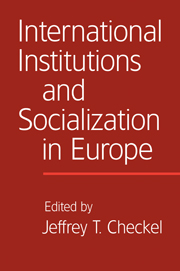Process Tracing
From Metaphor to Analytic Tool
$38.99 (P)
Part of Strategies for Social Inquiry
- Editors:
- Andrew Bennett, Georgetown University, Washington DC
- Jeffrey T. Checkel, Simon Fraser University, British Columbia
- Date Published: November 2014
- availability: Available
- format: Paperback
- isbn: 9781107686373
$
38.99
(P)
Paperback
Other available formats:
Hardback, eBook
Looking for an examination copy?
If you are interested in the title for your course we can consider offering an examination copy. To register your interest please contact collegesales@cambridge.org providing details of the course you are teaching.
-
Advances in qualitative methods and recent developments in the philosophy of science have led to an emphasis on explanation via reference to causal mechanisms. This book argues that the method known as process tracing is particularly well suited to developing and assessing theories about such mechanisms. The editors begin by establishing a philosophical basis for process tracing - one that captures mainstream uses while simultaneously being open to applications by interpretive scholars. Equally important, they go on to establish best practices for individual process-tracing accounts - how micro to go, when to start (and stop), and how to deal with the problem of equifinality. The contributors then explore the application of process tracing across a range of subfields and theories in political science. This is an applied methods book which seeks to shrink the gap between the broad assertion that 'process tracing is good' and the precise claim 'this is an instance of good process tracing'.
Read more- Defines process tracing and its relation to mechanism-based accounts of social change, demonstrating how process tracing is used to measure causal mechanisms in empirical research
- Advances clear standards for doing process tracing well, enabling researchers to distinguish systematic from weak applications of the method
- Conceptual discussion is grounded in empirical analysis so students from across a range of subfields in political science will find practical, hands on advice for doing process tracing well
Reviews & endorsements
"Bennett and Checkel have assembled an impressive group of scholars on the cutting-edge methodological issues involved in process tracing, while at the same time providing concrete, practical advice for scholars who wish to use this technique of analysis in a variety of different research programs. As a result of this dual approach, this volume represents a steep change from earlier methodological studies on process tracing and fills a real gap in scholarship. There is no doubt that it will be compulsory reading on graduate-level courses in qualitative methodology for a long time to come."
Giovanni Capoccia, University of OxfordSee more reviews"Bennett and Checkel's remarkable book will bring process tracing to the attention of a wide spectrum of disciplines - sociology, anthropology, history, public policy analysis and beyond. This valuable tool for causal inference has been developed primarily by political scientists, and their volume will accelerate much wider adoption of the method."
David Collier, Robson Professor, University of California, Berkeley"This volume is the next milestone in the dynamic debate over causal mechanisms and the standards and practices of process tracing. These contributions by leading figures in the discipline covering a broad range of topics and research areas are a must-read for anyone interested in and using qualitative methods."
Ingo Rohlfing, Bremen International Graduate School of Social SciencesCustomer reviews
Not yet reviewed
Be the first to review
Review was not posted due to profanity
×Product details
- Date Published: November 2014
- format: Paperback
- isbn: 9781107686373
- length: 342 pages
- dimensions: 247 x 174 x 20 mm
- weight: 0.61kg
- contains: 13 b/w illus. 9 tables
- availability: Available
Table of Contents
Preface
Part I. Introduction:
1. Process tracing: from philosophical roots to best practices Andrew Bennett and Jeffrey T. Checkel
Part II. Process Tracing in Action:
2. Process tracing the effects of ideas Alan M. Jacobs
3. Mechanisms, process, and the study of international institutions Jeffrey T. Checkel
4. Efficient process tracing: analyzing the causal mechanisms of European integration Frank Schimmelfennig
5. What makes process tracing good? Causal mechanisms, causal inference, and the completeness standard in comparative politics David Waldner
6. Explaining the Cold War's end: process tracing all the way down? Matthew Evangelista
7. Process tracing, causal inference, and civil war Jason Lyall
Part III. Extensions, Controversies, and Conclusions:
8. Improving process tracing: the case of multi-method research Thad Dunning
9. Practice tracing Vincent Pouliot
10. Beyond metaphors: standards, theory, and the 'where next' for process tracing Jeffrey T. Checkel and Andrew Bennett
Appendix. Disciplining our conjectures: systematizing process tracing with Bayesian analysis.
Sorry, this resource is locked
Please register or sign in to request access. If you are having problems accessing these resources please email lecturers@cambridge.org
Register Sign in» Proceed
You are now leaving the Cambridge University Press website. Your eBook purchase and download will be completed by our partner www.ebooks.com. Please see the permission section of the www.ebooks.com catalogue page for details of the print & copy limits on our eBooks.
Continue ×Are you sure you want to delete your account?
This cannot be undone.
Thank you for your feedback which will help us improve our service.
If you requested a response, we will make sure to get back to you shortly.
×






